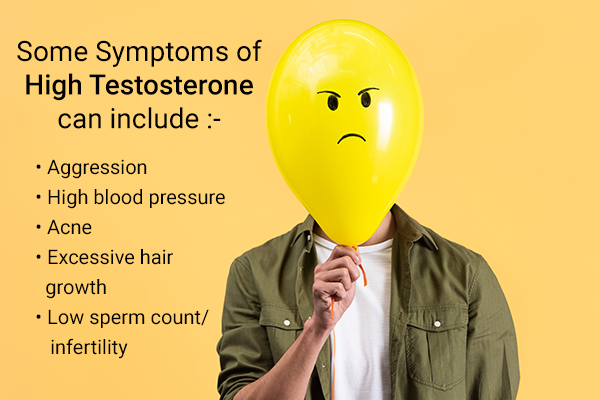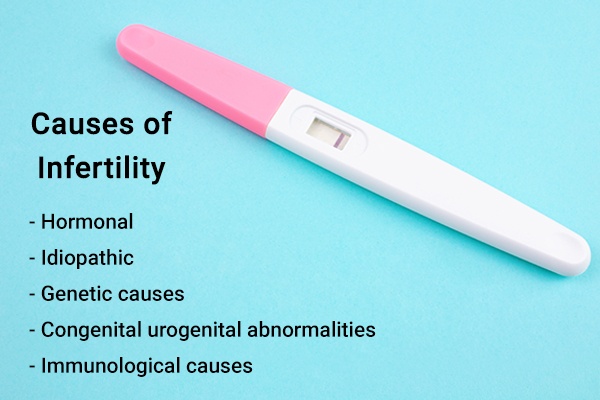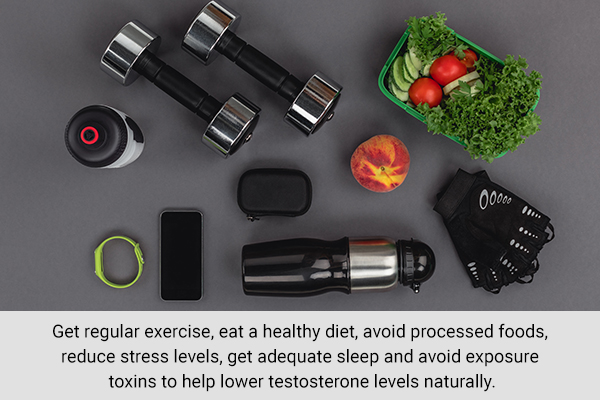In this article:
Testosterone is the male sex hormone that’s responsible for the majority of sexual attributes in males. Typically, it drives what’s known as “masculine” traits – hair growth, muscle mass, and body fat distribution.

However, in some cases, elevated testosterone levels can have negative effects on males’ fertility.
There are a lot of reasons for male infertility, but one that you might not have considered is high testosterone levels. It is important to differentiate between high testosterone levels caused by consuming supplements and those caused by various disorders.
Read more to find out how high testosterone levels cause male infertility and what you can do to reduce your chances of developing the condition.
Does High Testosterone Levels Cause Infertility?
Testosterone plays a role in fertility, but high levels of testosterone can lead to problems with sperm production and may cause infertility. (1)
Just as a proper balance of other hormones such as insulin and thyroid hormones are needed to maintain good health, proper levels of testosterone are needed to produce sperm and maintain a man’s sex drive. Hence, an increase in testosterone may cause male infertility.
While high testosterone levels are often associated with increased fertility, there is some evidence that suggests that extremely high testosterone levels may actually decrease fertility.
One study found that men with very high testosterone levels were more likely to have lower sperm counts and less motile sperm. (2) It’s not entirely clear why this might be the case, but it’s possible that high levels of testosterone could interfere with the production or movement of sperm. (2)
High Testosterone Levels: Causes, Symptoms, Consequences, and Testing

Testosterone is the main hormone responsible for male reproductive function. It plays a key role in sperm production and also regulates sex drive and libido.
Testosterone is the primary male sex hormone and is responsible for the development of secondary sex characteristics in men. It also plays a role in fertility, with higher levels of testosterone associated with increased sperm production.
Causes
High testosterone levels, or hypergonadism, can be caused by several factors:
- Genetic abnormalities
- Autoimmune disorders
- Infections
Symptoms
Some symptoms of high testosterone include:
- Aggression
- High blood pressure
- Acne
- Excessive hair growth
- Low sperm count/infertility
Consequences
Abnormally high testosterone levels can negatively impact fertility, especially if you are using steroids or certain supplements. Some of the impacts of high testosterone on fertility parameters include:
- Sperm count: Too much testosterone can have a negative effect on fertility, as it can lead to lower sperm counts and reduced sperm quality. (3)
- Sperm quality: Some studies have shown that high testosterone levels can reduce the number of sperm that are produced and can also decrease the quality of the sperm. (4) This can make it more difficult for a man to conceive. (5)(6)
Testing
If you’re concerned about your fertility, it’s worth talking to your doctor about your testosterone levels. Your doctor may then recommend the following investigations:
- Examination for testicular abnormalities and varicocele, which is an enlargement of the veins that transport blood away from the testicles.
- Sperm count – If this is low, then blood is drawn and tested for follicle-stimulating hormone levels
- Assessment for gonadotropin deficiency
Your doctor may recommend biochemical testing including a hormonal panel to test for:
- Testosterone levels
- Sperm count
- Sperm motility
Treatment may vary depending on the diagnosis. However, it is important to note that testosterone treatment is not a cure for infertility and may not be effective in all cases.
What Is Infertility?

Infertility is defined in men and women who cannot achieve pregnancy even after 1 year of unprotected intercourse without birth control or in women who have two or more failed pregnancies.
There are several causes of infertility, mainly categorized into ejaculatory issues, absence or low levels of sperm, and abnormal shape or movement of sperm. Some of the major causes among men are:
- Hormonal: Head trauma, radiation to the head, testosterone supplementation, or hyperthyroidism can alter testosterone levels.
- Idiopathic: This occurs in 10%–20% of cases when all semen parameters are normal, but the male is infertile.
- Genetic causes: Chromosomal abnormalities, Y-chromosome microdeletion, AR mutations, and other changes in the genetic makeup can affect testosterone levels.
- Congenital urogenital abnormalities: Absent, dysfunctional, or obstructed epididymis, congenital abnormalities of the vas deferens, undescended testes, cysts in the ejaculatory duct, etc., can cause infertility.
- Immunological causes: Tuberculosis and fungal infections can cause male infertility. (7)
Other Factors to Check That Can Cause High Testosterone Levels and Impact Fertility in Males
- Lifestyle choices and medical conditions can contribute to high testosterone levels in males, including the use of anabolic steroids, excessive alcohol consumption, tobacco usage, uncontrolled diabetes, and smoking. (8)(9)(10)
- Testosterone levels increase dramatically with even single sessions of resistance training. (11) Hence, for males who have high testosterone levels, it might be better to consider other forms of exercise to regulate their testosterone better.
- Certain forms of cancer may increase testosterone levels. (12)
- Patients undergoing testosterone-replacement therapy (TRT) may also experience infertility.
- Testosterone is a contraceptive and should not be used in men who are concerned about fertility. (13)
If you are concerned that high testosterone levels may be affecting your fertility, it is important to speak to a doctor or fertility specialist who can investigate the cause and recommend treatment options.
Treatment Modalities to Lower Elevated Testosterone Levels in Males

It is possible to lower testosterone levels naturally without resorting to medical intervention. Here are some tips:
1. Get regular exercise
Exercise can help to regulate hormone levels, including testosterone. (14)
2. Eat a healthy diet
A nutritious diet helps to promote hormone balance and can reduce the levels of testosterone in the body. (15) There is evidence that the food products mentioned below can be helpful in balancing testosterone levels, but still more research studies are required to prove this.
- Soy: It was earlier believed that the phytoestrogens in soy would reduce testosterone levels in men, (16) but recent research has shown that it is not so. (17)(18)
- Flaxseeds: Research has shown that regular intake of flaxseeds helps in reducing testosterone levels in women with polycystic ovary syndrome (PCOS), who have high testosterone levels, but research is not clear whether the same effect is seen in men as well. (19)
- Spearmint: Spearmint tea has also shown testosterone-lowering effects, but this has been proven only among a PCOS population, not among a male population. (20)
3. Avoid processed foods
Overconsumption of processed foods has been shown to disrupt testosterone levels. (21)
4. Reduce stress levels
Stress can interfere with hormone production and lead to higher testosterone levels. Practice stress-reduction techniques such as yoga or meditation. (22)
5. Get adequate sleep
Sleep is important for overall health and can also help to keep hormone levels in check. (23)
6. Avoid exposure to toxins
Environmental toxins can disrupt hormone function and lead to higher testosterone levels. (24) Be mindful of your exposure to chemicals, pesticides, and other pollutants.
Most-Asked Questions About High Testosterone Levels and Infertility in Males

What are the medical treatments for infertility in males?
Medical treatment for infertility varies depending upon the cause of infertility. If low testosterone levels are the cause, further investigation is required and supplementation with testosterone may be recommended by your doctor.
What are the symptoms associated with high testosterone levels?
There are very few symptoms of high testosterone levels in men and may vary from person to person. Hence, it is important to have regular medical checkups, especially after the age of 45, in order to check for abnormalities.
Does taking supplements also cause infertility in males?
Taking supplements does not directly cause infertility if they are taken under proper medical supervision. Always consult your doctor or healthcare practitioner before consuming supplements.
What is a normal testosterone level by age?
The normal reference range for testosterone levels is between 264 and 916 ng/dL. (25)
Does masturbating reduce testosterone?
A recent pilot study has shown that masturbating reduces one parameter of testosterone (free testosterone), but not other parameters such as the ratio. (26) However, this was a pilot study on a small sample size, and the results may not be significant for a larger population. No study has provided any conclusive evidence so far.
Whether you choose to or not to masturbate is entirely a personal choice.
Final Word
In conclusion, yes, high testosterone can cause infertility in males. However, it is important to keep in mind that this is not the only factor that can contribute to male infertility.
There are many other potential causes of male infertility, so it is important to speak with a doctor if you are concerned about your fertility.
- Was this article helpful?
- YES, THANKS!NOT REALLY


